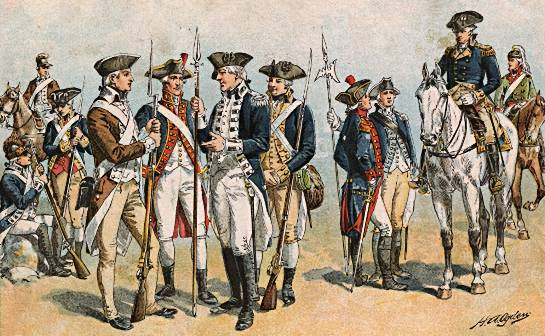
Two of our most popular movie stars from today’s big screen have ancestors who fought in the American Revolution.
Brad Pitt’s sixth great-grandfather, Abraham Hammer, who was a Quaker, was told to leave his Quaker community in 1768 for “warlike preparations.” He was among the many who petitioned North Carolina for unjust taxation. Their petition later started the Battle of Alamance, which is considered to be one of the first battles of the American Revolutionary War. (Source: Access Hollywood)
According to the NC Historic Sites webpage on the Battle of Alamance:
Here in 1771, an armed rebellion of backcountry farmers called Regulators battled with royal governor William Tryon's militia. The spark for this conflict was growing resentment in the Carolina colony against the taxes, dishonest sheriffs, and illegal fees imposed by the British Crown. In response, the Regulators were formed and began to fight back. Though the rebellion was crushed, a few years later their tactics became a model for the colonists fighting the British in the American Revolutionary War.
The battle began on May 16 after the Regulators rejected Tryon's suggestion that they disperse peacefully. Lacking leadership, organization, and adequate arms and ammunition, the Regulators were no match for Tryon's militia. Many Regulators fled, leaving their bolder comrades to fight on. …The rebellion of the Regulators was crushed. Nine members of the king's militia were killed and 61 wounded. The Regulator losses were much greater, though exact numbers are unknown. Tryon took 15 prisoners; seven were hung later. Many Regulators moved on to other frontier areas beyond North Carolina. Those who stayed were offered pardons by the governor in exchange for pledging an oath of allegiance to the royal government.
Johnny Depp’s fifth great-grandfather William Depp served in the American Revolution. He fought in the March 1781 Battle of Guilford Courthouse in North Carolina. He enlisted in the Virginia state militia three times. (Source: Access Hollywood)
According to the National Park Service webpage on the Battle of Guilford Courthouse:
On March 15, 1781. the largest, most hotly-contested battle of the Revolutionary War's Southern Campaign was fought at the small North Carolina backcounty hamlet of Guilford Courthouse. Major General Nathanael Greene, defending the ground at Guilford Courthouse with an army of almost 4,500 American militia and Continentals, was tactically defeated by a smaller British army of about 1,900 veteran regulars and German allies commanded by Lord Charles Cornwallis. After 2 1/2 hours of intense and often brutal fighting, Cornwallis forced his opponent to withdraw from the field. Greene's retreat preserved the strength of his army, but Cornwallis's frail victory was won at the cost of over 25% of his army.
Guilford Courthouse proved to be the highwater mark of British military operations in the Revolutionary War. Weakened in his campaign against Greene, Cornwallis abandoned the Carolinas hoping for success in Virginia. At Yorktown, seven months after his victory at Guilford Courthouse, Lord Cornwallis would surrender to the combined American and French forces under General George Washington.
Updated: Monday, 18 April 2011 10:39 AM EDT
Permalink | Share This Post





